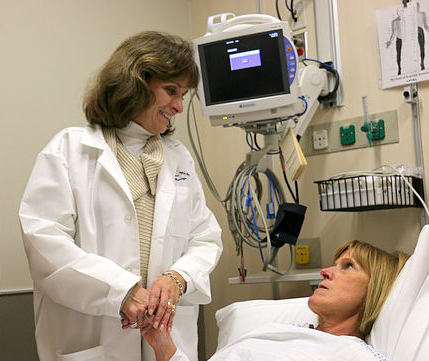
“With all this emphasis on the making of nursing an intellectual discipline comparable with other such disciplines, I hope most fervently that the professional nurse will not get too far away from the actual care of the patient . . . . I plead for skilled physical ministration as a very important part of patient care along with emotional support, communication, and understanding.” — Dean Carolyn Ladd Widmer in an address to Sigma Theta Tau in the 1960s.
The 2016 Carolyn Ladd Widmer Outstanding Alumni awardee Debra Abromaitis, BS (’81), MS, RN, has demonstrated conspicuous professional and community leadership and service throughout her thirty-five year career since graduating from UConn’s School of Nursing.
As UConn Health’s current director of quality, regulatory compliance and patient support, Abromaitis oversees the complex relationships and requirements of patient relations, volunteers, interpreter services, pastoral services, environment of care, emergency management, quality, and regulatory compliance. As a leader, she collaborated with an inter-professional team to conceive and design a patient binder given to all patients upon admission to simplify patient information and improve information sharing and continuity of care. In a recent survey, over 75% of employees agreed or strongly agreed that the organization is actively engaged in improving the culture of safety.
At the same time, Abromaitis volunteers on Farmington’s Community Emergency Response Team and as a director for Special Olympics Connecticut.
Her UConn Health career began in 1986 and has included roles of increasing responsibility, from clinical nursing supervisor to director of patient support. Her early career also included work as a staff nurse at Waterbury Hospital and a volunteer nurse at the American Hospital in Istanbul, Turkey. Awarded the Master of Science degree in Nursing from Regis University, Abromaitis was inducted into the honor society Sigma Theta Tau International. The global reach of Abromaitis’s nursing leadership and her commitment to a variety of vulnerable populations typifies the UConn nurse as our founding dean envisioned the nurse’s role decades ago.
Dean Widmer in an article published in 1955 narrating the professional friendship between her maternal grandfather, Cyrus Hamlin, and Florence Nightingale during the Crimean War observed: “When Grandfather asked the chief physician why the patients could not have clean clothing, he was told that no satisfactory laundry facilities had been found, that the clothing was too filthy to be cleaned anyway, and that ‘every man had better mind his own business.’ ‘I thought,’ says [Grandfather Hamlin], ‘that in such a scene of suffering it was my “own business”
to mitigate it.’”
Through their leadership, UConn nurses like Abromaitis make it their business to mitigate human suffering.



